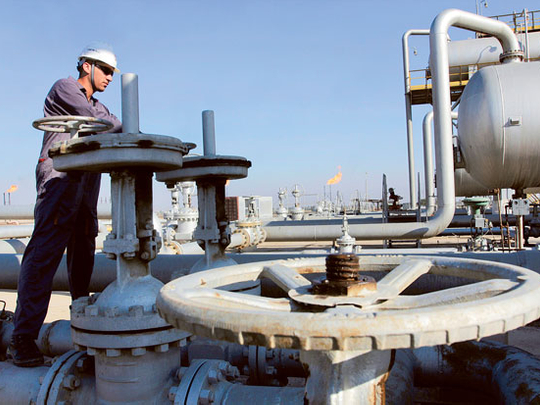
Abu Dhabi: Countries which are battling insurgency and economic sanctions will be the first one to get affected as global oil prices continue to drop due to oversupply and lack of demand, energy experts said.
The Organisation of the Petroleum Exporting Countries (Opec), which met last week in Vienna, refused to cut the production to arrest the slide of prices. It left the production target unchanged at 30 million barrels per day causing Brent crude to tumble further. Prices hovered around $70.15 per barrel on Sunday.
Tommy Amstrup Laursen, director of Ramboll Oil & Gas Middle East, said Libya, Iraq and Iran would face immediate problems.
“They’ve been into trouble. [A] drop in prices will affect their revenue and development projects would be put on hold,” Laursen said.
Laursen said Gulf countries would not feel the pressure but in the longer run some of their development projects could stall.
“They have cash reserves to sustain the price slide. Existing projects are already funded but future projects might get affected.”
He believes prices might stabilise after a year to between $85 to $90. “It is a temporary phase,” he said.
Arjuna Mahendran, a chief investment officer at Emirates NBD, said Gulf countries are insulated from the crisis at the moment.
“They have accumulated good cash reserves over the years. It may not be a big problem for them but it is a tough time for Libya, Iraq and Iran. GDP growth will slow down and budgets will be difficult to fund. They have to cut down on subsidies and raise taxes,” Mahendran said.
“Though fall in prices is bad for oil producing countries but it will help oil importing countries like India and China,” he added. “It will spur the global growth and revive the economy. We will see the effect in the next six to twelve months.”
Other Opec countries like Venezuela, Algeria, Nigeria, Ecuador and Angola will also see their revenues plunging.
Venezuelan President Nicolas Maduro said Caracas will keep trying for a cut in oil production until prices rebound to $100 per barrel. The country is heavily dependent on oil revenues to support its economy.
Dr Sara Vakhshouri, president of US-based SVB Energy International and an expert on Iran, said the country’s economy is going to hurt but they could overcome this by raising taxes.
“I think they can manage it but it depends for how long. It will be hard for people due to taxes.”
The country is under economic sanctions over its nuclear programme and is holding negotiations with a group of six western nations to end sanctions and increase its exports.
Francisco Quintana, an analyst from Asiya Investments said Iran will be the one to suffer first.
“The country needs a price of $130 to balance budget. The impact is probably being felt already quite acutely by the authorities there. The situation in terms of reserves is not particularly buoyant, with close to $70 billion.”
Next would be Iraq, which needs a $100 barrel to square the budget, with similar reserves to Iran, he said.
“Oman and Bahrain also have high breakeven prices and are already looking into measures to cut down spending. Their level of reserves is also low. “
If low prices continue, Oman and Bahrain will have to revise very seriously their budgets for 2016, he added.
UAE is unlikely to face the heat. Investments in the oil sector will continue despite the drop in prices, the country said last week. It produces around 2.8 million barrels per day and intends to increase the production to 3.7 million barrels per day by 2017.












